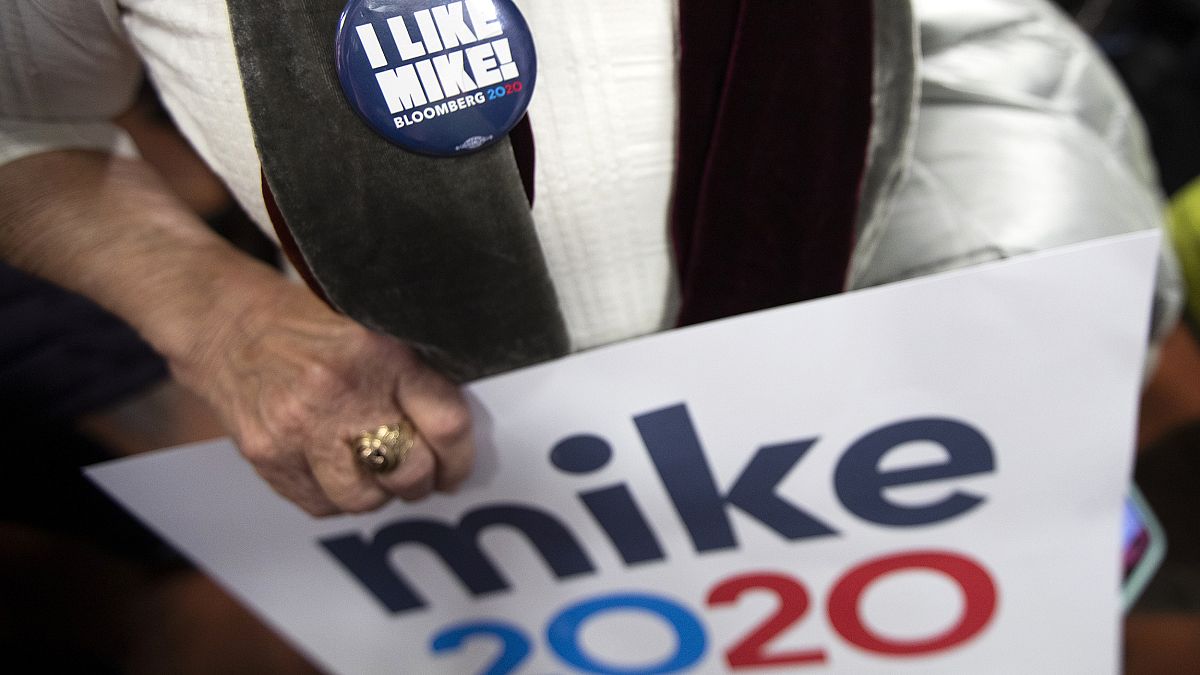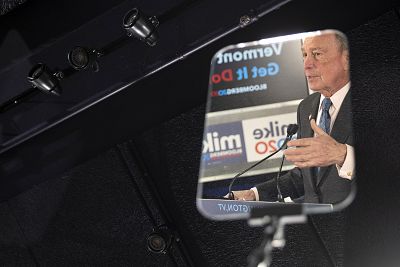The 78-year-old billionaire as a meatball in sauce? "I don't really think it worked," one Democratic strategist said.
Adrienne Elrod, a Democratic strategist who worked on Hillary Clinton's 2016 campaign, was certain the Mike Bloomberg campaign account had been hacked.
On Jan. 14, the night of a Democratic presidential debate that did not include Bloomberg, his campaign's Twitter account sent out a number of eyebrow-raising tweets, including a picture of him photoshopped as a meatball, round and covered in sauce. Elrod reached out to the campaign to let them know of the intrusion.
"Oh my God, I don't know if you guys realize this — your account's been hacked," she recalled telling the campaign. "And they're like: 'No, no, no. It's part of our strategy.'"
While Bloomberg has launched an unprecedented $500 million advertising campaign to plug his message as being a technocratic leader with the best executive experience in the race, he's embarked on one of the more bizarre efforts to use social media — and embrace its irreverent tone — in an effort to connect with voters.
It's a move that has drawn attention but not necessarily raves, as critics have said the efforts have at times come off as a futile attempt to use internet culture to promote the candidacy of a 78-year-old billionaire. "How do you do, fellow kids?" as the internet might respond.
"I don't really think it worked," Elrod said of the January debate tweets, which were Bloomberg's initial social effort aimed at differentiating him online. "Because for Bloomberg, you want to come off looking presidential."
The meatball was just the start, but not all of these posts were seen as similarly harmless. After Bloomberg's first debate appearancelast month, his campaign tweeted out an edited video that made it seem as if crickets chirped while candidates were silent in response to a Bloomberg question. Later, the campaign would publish and delete a series of satirical quotes it attributed to Sen. Bernie Sanders, I-Vt., under the hashtag #BernieOnDespots.
What garnered the most attention, however, was when the campaign unleashed a meme-blitz in mid-February, paying influencers to post images promoting Bloomberg as a funny dad who kind of gets what the kids are doing online. Working with influencers who had a combined audience of more than 60 million followers, as The New York Times reported, Bloomberg was able to increase his Instagram following by nearly 50,000 while receiving extensive media coverage for the efforts.
The campaign has also hired more than 500 "deputy digital organizers" to post pro-Bloomberg messages online.
Bloomberg's social media experiments come as politics and internet humor have collided in recent years, with President Donald Trump's campaign having seized on user-generated images as a way to promote itself online. Andrew Yang's recent Democratic campaign also received a boost from an online fanbase that rallied around his calls for a universal basic income, while Sanders' supporters have turned several images of the Democratic presidential contender into popular memes.
Democrats watched the Trump campaign in 2016, particularly Brad Parscale, then the social media director and now the 2020 campaign manager, "really use these new and innovative techniques to engage voters in a way that we were not doing," according to a senior Bloomberg campaign aide who asked to remain anonymous to discuss campaign strategy.
Federal Election Commission records show that Bloomberg's campaign has also spent more than $25 million on his little-known tech company, Hawkfish, built with the aim of countering what is seen as Trump's advantage online.
The campaign is trying to aim much of this content at younger voters outside of the political process.
"It's all about how can we reach as many people as possible on the mediums they actually consume their news," the senior aide said.
Few campaigns have tried to seize on internet culture and generate their own content. The aide called the efforts "a new way of digital organizing" similar to how a campaign pays a volunteer to go door-knocking, adding "no one is doing this."
But the Bloomberg effort is the most manufactured effort yet to seize the memes of production. It's an effort that has also made the Bloomberg campaign the target of the internet culture it is seeking to tap.
One popular influencer, Josh Ostrovsky, more popularly known as The Fat Jewish, declined to work with Bloomberg because of his policies as the former mayor of New York and publicly labeled Bloomberg "a colossal s---bag."
During a private event at Harvard Law School last week, a recording of which was obtained by NBC News, Ostrovsky said the Bloomberg campaign wanted him to build their entire social media program and had him sign "like 50" nondisclosure agreements.
"They hit me up and said we want you to architect this program to run a meme campaign," he said. "We want to use influencers. I thought this is f---ed up. When I am the one raising the red flag, you have got a serious problem."
The Bloomberg campaign did not respond to a request for comment on those comments.
Analysts who spoke with NBC News spoke were not so charitable in assessments of the strategy, calling it "cringy" and "cynical."
But they left the door open to it proving fruitful in some way.
Caleb Gardner, founding partner of the digital consulting firm 18 Coffees, who formerly worked on social media for the Obama-aligned advocacy group Organizing for Action, said that Bloomberg's social push is "probably the most cynical social strategy of all the candidates that I've seen."
"I'm also not convinced that it's not effective," he added.
Tyler Farnsworth, founder and chief growth officer of August United, an influencer marketing agency, said that it initially "came as a surprise but it made sense very quickly."
He said the strategy has its merits, but might not work for a presidential candidate.
""I love the idea of working with meme accounts that have high engagement at low cost," he said. "But is that a good fit for a political candidate? Particularly one that's so cringeworthy? No, I don't think so."

